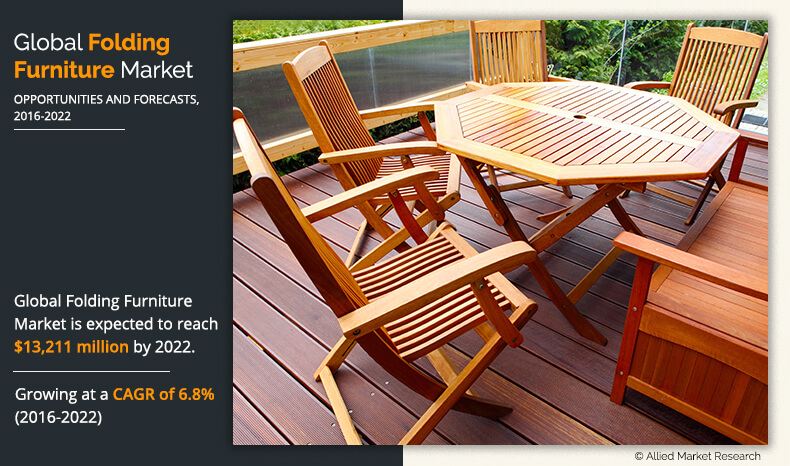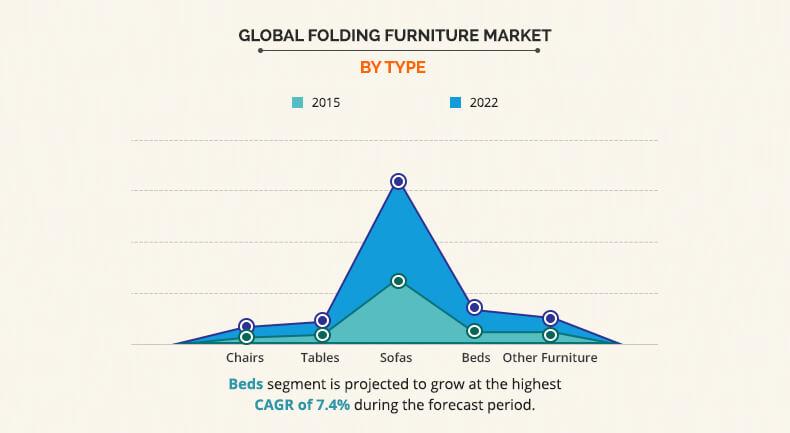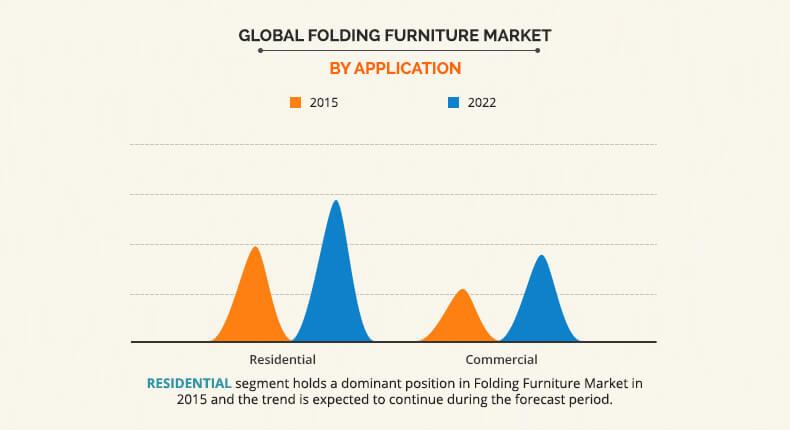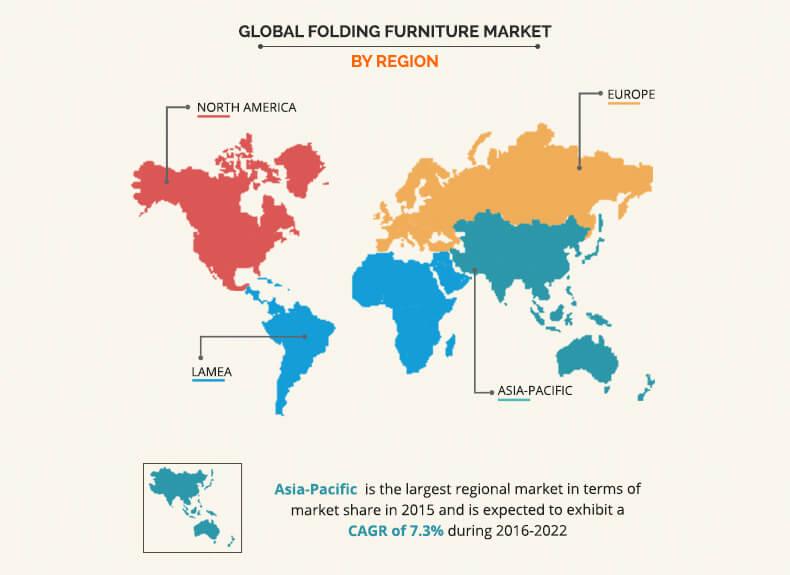Folding Furniture Market Overview:
Folding Furniture Market is projected to grow at a CAGR of 6.8% from 2016 to 2022, to reach $13 billion by 2022. Adoption of folding furniture is on a rise in most populous cities of the world, namely, Tokyo, Beijing, New York, and Delhi owing to increase in the number of smaller homes. This category of furniture takes into account economy of space and its demand is expected to gain popularity among customers throughout the forecast period.
Rapid pace of urbanization, adoption of co-living trend in the U.S., and growth in real estate market influence the folding furniture industry. In the U.S., a growing trend of millennials opting for rented apartment has been observed, who are more inclined towards affordable, multifunctional, and smaller furniture that suits their urban and dynamic lifestyles.
The folding furniture manufacturers are trying to cater to the metropolitan ways of life of consumers and are looking forward to add more appealing features to furniture. To cater to the needs of consumers seeking furniture that easily get transformed from work to living mode, the market players are widening their product portfolio. Their furniture offerings are now more focused towards being light-weight, easy to tuck in, aesthetically appealing, and ergonomically contoured, thus supplementing the growth of folding furniture market.
Owing to increase in demand for space, manufacturers stand an opportunity to innovate furniture designs and make it more transformable. Wall bed is an example, as it is easy to pull them down and push them back to the wall. Another example of such type of furniture includes bookshelves that can be transformed into beds and coffee tables that can be converted into dining tables. The most recent trend is of Bookniture—a compact furniture hidden in a book. Designed to look as small notebook, bookniture can be unfolded into a footrest, standing desk, and portable side table. Therefore, increase in demand for folding furniture is the promising opportunity for manufacturers to develop transforming furniture pertaining to customer’s need.
Investments in design, skills, research, creativity, innovation, and new technologies result into the development of new products in line with changing population structure, needs, and lifestyle creating an opportunity for manufacturers.
Notable trend within this segment of the market is the rise in demand for light-weight, ergonomic, and durable chairs that can be stacked and stored quickly and easily. Also, the market witnessed an inclination for demand for fruitwood folding chair for both indoor and outdoor seating. They not only offer the required comfort and ease of cleaning but also the elegance and rustic charm of the Chiavari chairs.
The rise in expenditure for celebration and events such as commencement ceremonies, weddings, and graduation ceremony will continue to be the major driving factors for the growth of this market. As the sitting arrangement is the significant part for such events, the use of folding chairs in such events transform space and gives an aesthetic appeal. Besides, effective product range launched by the companies ensuring cost-effective, ergonomically designed folding chairs as compared to traditional chairs has further boosted the market growth.
The folding furniture market is analyzed based on product type, application, and distribution channel. Based on product type, it is classified into chairs, tables, sofas, beds, and other furniture. The application segment comprises foldable furniture used for residential as well as for commercial purpose. Based on distribution channel, foldable furniture is sold through offline and online sales channels. Moreover, the market is analyzed across North America (U.S., Canada, and Mexico), Europe (UK, Germany, France, Italy, and rest of Europe), Asia-Pacific (China, Japan, India, Australia and rest of Asia-Pacific), and LAMEA (Brazil, Saudi Arabia, South Africa, and Rest of LAMEA).
Asia-Pacific: Dominant market for foldable furniture
It is observed that increased number of youngsters tend to move to large cities for better opportunities. This phenomenon gradually decreases the average living area as well as increases the cost of houses. For instance, in Beijing, the average living area available per person is only 21 square meters. Therefore, transforming furniture is the best suitable option to solve such a problem. Cities like Beijing possess high growth potential for this market. Urbanization is other factor that drives the folding furniture market growth as it decreases the average living space and increases the value of available limited space, where space saving furniture is the most suited option. Mumbai, Kolkata, Karachi, and Shenzhen are other cities that possess high growth potential.
Furniture manufacturers are taking efforts to innovate their furniture products pertaining to the needs of consumers. For instance, wall bed that is designed to offer space saving solution for tiny houses and studio apartments is very easy to pull down and push back to the wall. Another example of such type of furniture includes bookshelves that transform into beds and coffee tables that convert into dining tables.
To gain market share, manufacturers such as IKEA have planned to open their first store in India and increase their distribution in China. In addition, growth of online retailing also supports market growth.
Increase in raw material prices is expected to hamper folding furniture market growth
Manufacturers of furniture have seen an increase in raw material (steel, wood, foam, leather) prices in the recent years. In addition, cost of coatings and finishing has also increased, which has resulted in price hike for steel furniture in the U.S. and China. Moreover, prices are high for fibers and foams as well, which may also hamper the market growth.
To mitigate such a situation, manufacturers have cut their costs and added new equipment and techniques to obtain efficient output. This factor is expected to have a long-term effect on the market as it is not predictable the duration for which the raw material prices would remain high.
Key Benefits
The study provides an in-depth analysis of the global folding furniture market, with current trends and future estimations to elucidate the imminent investment pockets.
It presents a quantitative analysis from 2014 to 2022, which is expected to enable the stakeholders to capitalize on prevailing market opportunities.
Actual historical figures for 2014 and 2015 and provides forecasts for 2016 to 2022, considering 2015 as base, are listed.
Competitive intelligence highlights the business practices followed by leading players across various regions.
Folding Furniture Market Report Highlights
| Aspects | Details |
| By Product Type |
|
| By Application |
|
| By Distribution Channel |
|
| By Geography |
|
| Key Market Players | Haworth Inc., Resource Furniture, Murphy Wall Beds Hardware Inc., Meco Corporation, Lifetime Products Inc., Expand Furniture, Sauder Woodworking Company, Bush Industries, Inc., Inter Ikea Systems B.V., Dorel Industries Inc. |
| Other players in the value chain include | Ashley Furniture Industries, Flexsteel Industries, Inc., Home Depot, Inc., La-Z-Boy Inc., Leggett & Platt Inc. |
Analyst Review
The growing population has resulted in increase in demand for space and resources, both of which is getting scarce. Major effects of the same can be witnessed in urban cities, wherein the accommodations are getting smaller to contain the increasing populace. Transforming furniture is one such solution that makes better and efficient use of the available space.
Furniture of this category can be convertible, transformable, and/or collapsible. One can configure this furniture in different ways to cater to their outdoor and indoor needs. For instance, a bed platform can be folded against a wall or turned into desk. As a result, this furniture is ideal for homes, hospitals, offices, second homes, community centers, and most commonly for compact spaces.
The rapid pace of urbanization, increase in single and dual living households, and the growing trend of classy yet compact furniture for enhancing the overall household aesthetics, support the adoption of folding furniture. Additionally, minimal use of sustainable material and online retailing of foldable furniture also boosts the market demand among the various income groups.
In 2015, Asia-Pacific region captured the maximum market share of folding furniture market and is anticipated to dominate over the forecast period. Growing urban population and rising growth of real estate has intensified the growth of the region over the past few years.
To support the rising need of folding furniture, manufacturers are taking efforts to develop furniture tailored to the needs of individuals. Design and assembly innovation led by both existing market players as well as startup offer attractive proposition for the buyers.
Loading Table Of Content...






